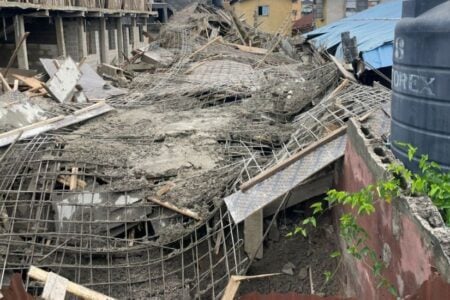Nigeria has recorded a total of 679 building collapse incidents, which have claimed at least 1,639 lives across the country, according to a new report by the Building Collapse Prevention Guild (BCPG). The report paints a worrying picture of the increasing rate of structural failures nationwide, with Lagos State accounting for more than half of all recorded incidents.
According to the Guild, the first recorded building collapse in Nigeria happened in October 1974 in Oyo State, when a multi-storey building caved in due to excessive loading, killing 27 people. However, the group also noted that some records trace the earliest incident to October 6, 1971, when a four-storey building under construction along Ajibade Street, off Mokola-University of Ibadan Road, in the Oremeji area of Ibadan, collapsed and killed 26 people.
The report revealed that Lagos State accounts for 53.9 per cent of all recorded building collapses in Nigeria, making it the worst-hit state. Abuja followed with 4.42 per cent, while Anambra had 4.27 per cent, Oyo 3.68 per cent, and Kano 3.39 per cent, completing the top five states with the highest number of collapses.
It added that states such as Taraba, Bayelsa, Gombe, and Yobe recorded their first-ever building collapses in 2022, showing that the problem has spread beyond the traditional hotspots of Lagos and Abuja. Zamfara, Sokoto, Katsina, Kebbi, and Bauchi were among states that have each recorded only one collapse since records began.
Data from the report also showed that between 1975, 1979, and 1981, no collapses were recorded, but the frequency of incidents has increased sharply in the past two decades. Despite the COVID-19 lockdown in 2020, Nigeria still recorded 45 building collapses that year, with Lagos accounting for 18 of them. The situation worsened in 2022, which saw the highest number of collapses ever recorded — 62 incidents nationwide, with Lagos contributing 20. In 2023, there were 52 cases, out of which 17 occurred in Lagos.
In 2024, the Guild said there were 47 reported collapses across 14 states. Lagos recorded 13, Abuja six, Anambra five, Kano and Rivers four each, while Jigawa and Plateau had three each. Osun and Delta recorded two each, while Niger, Abia, Edo, Oyo, and Ebonyi recorded one each.
For 2025, as of October, there have already been 37 recorded cases, beginning with the first incident of the year in Rivers State on January 4. Lagos again leads with 12 cases, followed by Ekiti and Abia with four each, Anambra with three, and Oyo, Abuja, and Ogun with two each. Other states such as Yobe, Delta, Edo, Kano, Ebonyi, Kwara, Katsina, Jigawa, and Taraba have also recorded at least one case.
The report also recalled one of Nigeria’s most tragic incidents — the collapse of a 21-storey building in Ikoyi, Lagos, on November 1, 2021, which killed 52 people. It was described as the tallest building collapse ever recorded in the country.
Reacting to the report, a member of the BCPG Amuwo Cell in Lagos State, Dr. Victor Oyenuga, described the rising number of building collapses as alarming and deeply worrisome. He said the frequent incidents have caused huge losses in lives and properties, especially in major cities like Lagos, Benin City, Port Harcourt, and Abuja.
Oyenuga lamented that many Nigerians have developed high blood pressure due to the trauma of losing loved ones and property to these collapses. He said visits to several collapse sites revealed how contractors and developers often cut corners, ignoring professional standards and endangering lives.
He explained that the consequences of building collapse go beyond the loss of lives. “There are huge economic losses,” he said, “including the cost of clearing debris, carrying out investigations to determine causes, conducting fresh soil tests, and redesigning buildings. In many cases, owners lose their sites entirely, especially in Lagos.”
Dr. Oyenuga also said repeated incidents have eroded public confidence in professionals within the built environment. He blamed weak enforcement by physical planning authorities and the failure of government to take decisive action against offenders.
He noted that some clients are also at fault, as they often prioritize cost-cutting over safety. “In many cases, the client is the culprit,” he said, stressing that corruption, poor regulation, and lack of technical expertise have all contributed to the growing problem.
The Building Collapse Prevention Guild called for stricter monitoring of construction projects across the country and better coordination among town planners, engineers, and architects. It also urged governments at all levels to enforce building codes and prosecute those found guilty of negligence or substandard construction.
Experts believe that unless the issue is tackled urgently, Nigeria risks further loss of lives and property as rapid urbanisation continues to increase demand for housing in major cities.
